Ditapis dengan
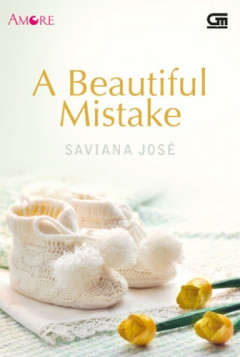
E-Book A Beautiful Mistake
Seorang laki-laki harus berani bertanggung jawab atas apa yang dilakukannya, Ricky tahu itu. Meskipun taruhannya adalah diusir dari rumahnya nan mewah, Ricky harus berani menerima konsekuensinya. Dia tidak mau meninggalkan Lasya dalam keadaan mengandung. Sementara Lasya sendiri dihadapkan pada kebingungan. Harus memilih antara Ricky dan Yuda, laki-laki yang amat mencintainya dan bersedia mener…
- Edisi
- Cet. 1
- ISBN/ISSN
- 9786020321561
- Deskripsi Fisik
- 232 hlm; 1,2 mb
- Judul Seri
- -
- No. Panggil
- 899.2213 SAV a
E-book Fundamental Approaches to Software Engineering
Many important theoretical and practical advances have taken place in the areaof Formal Methods (FMs), and impressive applications have been developed.Furthermore, FMs and their associated tools are now routinely used in manyindustries. However, their full potential remains partly unexploited. In pg. 57 ofa recent FMs survey [47], I gave my own view about their future in a positionstatement whe…
- Edisi
- -
- ISBN/ISSN
- 9783031909009
- Deskripsi Fisik
- 303 hlm
- Judul Seri
- -
- No. Panggil
- 005.1 MES f

Buku Harian Santa Faustina
”Aku memiliki cinta yang istimewa terhadap Polandia. Kalau ia mematuhi kehendak-Ku, Aku akan mengangkatnya kepada kekuasaan dan kekudusan. Dari negeri ini, akan muncul percik api yang akan mempersiapkan dunia untuk menyambut kedatangan-Ku yang terakhir.” (Buku Harian 1732)
- Edisi
- Cet. 1
- ISBN/ISSN
- 9789792121681
- Deskripsi Fisik
- l, 1046 hlm; 13 x 20 cm
- Judul Seri
- -
- No. Panggil
- 922.22 KOW b
E-book Language Contacts and Discourses in the Far North
With this volume, we invite you on a trip to the Far North of Europe, to Finland and its neighbouring countries Estonia and Sweden, and across the Arctic circle to the Lapland area which stretches from northernmost Scandinavia in the west to northern Finland and North-Western Russia. This is the area in which the Saami and Finnic peoples hav…
- Edisi
- -
- ISBN/ISSN
- 9783031429798
- Deskripsi Fisik
- 370 hlm
- Judul Seri
- -
- No. Panggil
- 439.5 BIJ l
Kitab Suci untuk Anak-anak
Kitab suci untuk anak-anak ini dipersembahkan bagi segenap keluarga Kristiani yang diharapkan dapat menjadi sarana untuk mendorong anak-anak semakin mengenal, mencintai, dan meneladani Yesus Kristus yang adalah Jalan, Kebenaran, dan Hidup.
- Edisi
- -
- ISBN/ISSN
- 9794979384
- Deskripsi Fisik
- illust + 399 hlm;
- Judul Seri
- -
- No. Panggil
- 220 GRA k
E-book The Globalization of Netherlandish Art
Is there a special role for the Low Countries in art history’s current focus on global mobility? How, and why, should we conceive of the globalization of Netherlandish art? The essays brought together in this volume examine how artworks produced in the wake of European expansion – produced in the Netherlands in reaction to the world outside Euro…
- Edisi
- -
- ISBN/ISSN
- 9789004705852
- Deskripsi Fisik
- 332 hlm
- Judul Seri
- -
- No. Panggil
- 949.2 AON t
E-book Land Tenure Security and Sustainable Development
While trekking through the forests of Indonesia Borneo far from any urban center, the sound of insects, mammals, reptiles, and the roaring river can be deafening. It is a testament to the forest’s immense biodiver-sity—some of which is found nowhere else in the world. Yet no more than a few kilometers away, the forests open up to an expanse of oil palm tre…
- Edisi
- -
- ISBN/ISSN
- 9783030818814
- Deskripsi Fisik
- 353 hlm
- Judul Seri
- -
- No. Panggil
- 301 ARR l
E-book Conversations with Tim Ingold : Anthropology, education and life
Tim Ingold is one of the world’s leading anthropologists. Over the past five decades, he has not only advanced thinking and research within the discipline of anthropology but also made significant contributions to a wide range of debates in both the arts and human-ities and the natural sciences. Characterised by a series of highly original attempts t…
- Edisi
- -
- ISBN/ISSN
- 9781917341028
- Deskripsi Fisik
- 240 hlm
- Judul Seri
- -
- No. Panggil
- 305.8 ING c
E-book Post Cinema : Cinema in the Post-art Era
For some time now, in newspapers and books, a series of words keep ap-pearing that begin with the pref ix “post-.” As for these new words, the key to understanding seems to be a semantics of ambiguity. Post does not indicate something absolutely different but something in-between: postcapital-ism would be a new phase of capitalism; postmodernism, a new f igure of modernism; and post-history…
- Edisi
- -
- ISBN/ISSN
- 9789463727235
- Deskripsi Fisik
- 367 hlm
- Judul Seri
- -
- No. Panggil
- 778.53 CHA p
E-book A Horizon of (Im)possibilities : A Chronicle of Brazil’s Conservativ…
The 2018 presidential election result in Brazil surprised many. Since then, numerous debates and a growing body of texts have attempted to understand this result and unearth the seeds that sowed what was understood by different analysts as the country’s ‘conservative turn’. In this introduction, we will not elaborate on all the factors that const…
- Edisi
- -
- ISBN/ISSN
- 9781908857927
- Deskripsi Fisik
- 257 hlm
- Judul Seri
- -
- No. Panggil
- 304.681 ARR a
E-book A Holter for Parkinson’s Disease Motor Symptoms : STAT-On
Parkinson’s disease (PD) is the second most frequent neurodegenerative disorder, with approximately 6.1 million people who live with PD in 2016 worldwide [1]. For several reasons that are not yet fully understood, the prevalence and incidence are expected to increase in the next years. According to the World Health Organization, globally, disability and death due to PD …
- Edisi
- -
- ISBN/ISSN
- 9781032632865
- Deskripsi Fisik
- 269 hlm
- Judul Seri
- -
- No. Panggil
- 610 AVI a
E-book Hybrid Investigative Journalism
In pursuit of its continued focus on holding power to account—locally, nationally and globally—investigative journalism1 as a practice has actively incorporated various digital skills and capabilities. The embrace of digital journalism has led to collages of skillsets that have come together in new ways to complement one another or merge into something unprece-dented. Th…
- Edisi
- -
- ISBN/ISSN
- 9783031419393
- Deskripsi Fisik
- 207 hlm
- Judul Seri
- -
- No. Panggil
- 070.4 BEB h
E-book Emotion, Reason and Action in Kant
Th is is a book about practical reason, action, and emotion in Kant. My aim is to answer what is the real importance of emotion for Kant. I will try to show that Kant had considerable views about emotions and that he was not blind to their importance in action in general. My object is not moral action, but action in general, including weak and even evil ones. My purpose is to show that Kant de…
- Edisi
- -
- ISBN/ISSN
- 9781350078376
- Deskripsi Fisik
- 221 hlm
- Judul Seri
- -
- No. Panggil
- 142 BOR e

E-book The Global Wireless: Transnational Radiotelegraphy and Its Disruption …
The Global Wireless charts a history of wireless beginning in the 1910s, when it was used as a tool for global communication, and ending as it declined and slowly fell from view after World War I. Examining the political negotiations and international communication networks, the book demonstrates how a wireless technology had already spread around the globe a century ago and prompted a radical …
- Edisi
- -
- ISBN/ISSN
- 9783111202327
- Deskripsi Fisik
- 249 halaman, ilus.
- Judul Seri
- -
- No. Panggil
- 172.4 RIK t
E-book Modes of Esports Engagement in Overwatch
A decade ago, it was still somewhat conventional to start a study by writ-ing how “esports is a novel phenomenon.” As we write this introduction in 2021, that is no longer true. Today, more than a thousand studies have been published on esports, including several books and special issues. Moreover, the work is no longer conducted purely in the “game studies” related fields, bu…
- Edisi
- -
- ISBN/ISSN
- 9783030827670
- Deskripsi Fisik
- 234 hlm
- Judul Seri
- -
- No. Panggil
- 794.8 APP m
E-book Taking English Planning Law Scholarship Seriously
This chapter explores the genesis and development of this volume, which lies largely in the relative neglect of planning by legal scholars. Planning is central to the response to many of the significant challenges of our time (from the climate and environmental crises to social and economic inequalities); and planning law raises some of the most fundamental questions face…
- Edisi
- -
- ISBN/ISSN
- 9781800082885
- Deskripsi Fisik
- 317 hlm
- Judul Seri
- -
- No. Panggil
- 346.04 ABB t
E-book Talking Dialogue : Eleven Episodes in the History of the Modern Interr…
The last two decades have seenadynamic increase in the number of activitiesthat are explicitlylinked to the notion of interreligious dialogue (IRD). All overthe world, empirical research projects underlinethe establishment of highlycomplex local scenes of these types of initiatives.¹Especiallyatthe nationallevel, it is possibleto identifyasignificant increase in dialogue organizations–either…
- Edisi
- -
- ISBN/ISSN
- 9783110529173
- Deskripsi Fisik
- 389 hlm
- Judul Seri
- -
- No. Panggil
- 939.4 BAR t
E-book Best Practice Guide for Positive Parenting
Our conception of what parenting should look like has changed considerably in our society. This is due not only to the large variety of family structures and the diversity of cultures that currently co-exist in our society, but also to a shift in mindset that touches the very heart of the parenting task. This can be expressed as the need to replace the concept of parental authority, which focu…
- Edisi
- -
- ISBN/ISSN
- -
- Deskripsi Fisik
- 80 hlm
- Judul Seri
- -
- No. Panggil
- 649.1 OCH b
E-book Heroism in Doctor Who 1963 – 2020
Doctor Who (1963–1989, 2005–) is a curiosity in the vast landscape of British tele- vision history. What started out as an educational children’s programme has transformed into a “pop-cultural artefact”1 and a “cultural phenomenon”.2 The Doctor, the eponymous hero of the BBC’s time travel programme, is a figure invested both with personal memori…
- Edisi
- -
- ISBN/ISSN
- 9783956509841
- Deskripsi Fisik
- 322 hlm
- Judul Seri
- -
- No. Panggil
- 384.55 HAR h
E-book Blue Planet Law The Ecology of our Economic and Technological World
In the twenty-first century, the internationalcommunity and states face the challenge ofreconciling the economic and technologicaldevelopment of our post-industrial societieswith the prevention or mitigation of globalenvironmental problems such as climatechange, ocean degradation, and biodiversityloss. Nowadays, international environmentallaw leaves up to the sovereignty of each statemost o…
- Edisi
- -
- ISBN/ISSN
- 9783031248887
- Deskripsi Fisik
- 280 hlm
- Judul Seri
- -
- No. Panggil
- 320.58 GAR b
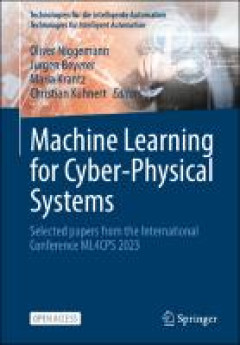
E-book Machine Learning for Cyber-Physical Systems: Selected papers from the …
This open access proceedings presents new approaches to Machine Learning for Cyber-Physical Systems, experiences and visions. It contains some selected papers from the international Conference ML4CPS – Machine Learning for Cyber-Physical Systems, which was held in Hamburg (Germany), March 29th to 31st, 2023. Cyber-physical systems are characterized by their ability to adapt and to learn: They…
- Edisi
- -
- ISBN/ISSN
- 9783031470622
- Deskripsi Fisik
- 130 halaman
- Judul Seri
- -
- No. Panggil
- 620.001 NIG m
E-book A Guide to Risk Management of Cultural Heritage
Heritage managers and caretakers often have to prioritize and make choices about how best to use the available resources to protect collections, buildings, monuments and sites. This means, for instance, having to decide among options such as increasing security against theft and vandalism, improving building maintenance to reduce water leaks, installing air conditioning in collection storage ar…
- Edisi
- -
- ISBN/ISSN
- -
- Deskripsi Fisik
- 118 hlm
- Judul Seri
- -
- No. Panggil
- 613.6 JUN a
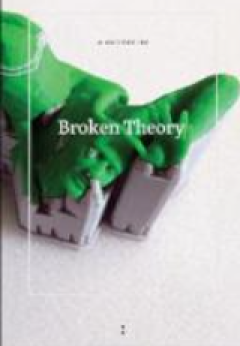
E-book Broken Theory
Broken Theory is a jettisoned collection of fragmentary writing, collected and collaged by new media artist, writer, musician, and theorist Alan Sondheim. Folding theoretical musings, text experiments, and personal confessions into a single textual flow, it examines the somatic foundations of philosophical theory and theorizing, discussing their relationships to the writer and body, and to the …
- Edisi
- -
- ISBN/ISSN
- 9781685710484
- Deskripsi Fisik
- 227 hlm
- Judul Seri
- -
- No. Panggil
- 142.7 ALA b
E-book Essays on Paula Rego : Smile When You Think about Hell
In the words of one of her exegetes, Paula Rego enters the Great Tradition of art by the back door, and once there lays down repeated visual statements concerning a binary world whose territorial lines are demarcated by the battle of the sexes (Rosengarten, 1999a, 6). In this pictorial universe, whose referent is realpolitik patriarchy, sex…
- Edisi
- -
- ISBN/ISSN
- 9781783747580
- Deskripsi Fisik
- 513 hlm
- Judul Seri
- -
- No. Panggil
- 750 MAN e
E-book Hepatocellular Carcinoma
he World Health Organization (WHO) estimates that, worldwide, approximately 900,000 individuals develop each year hepatocellular carcinoma (HCC), the most common form of liver cancer [1]. Overall, 69.8% of all HCC cases occur in males, with a male-to-female ratio of 2.66. Accordingly, HCC is the fifth most frequent incident cancer type in men, the ninth in women, and the …
- Edisi
- -
- ISBN/ISSN
- 9783031093715
- Deskripsi Fisik
- 217 hlm
- Judul Seri
- -
- No. Panggil
- 616.33 SER h
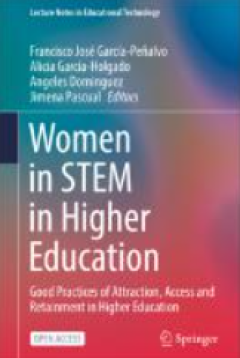
E-book Women in STEM in Higher Education : Good Practices of Attraction, Acce…
Women present a historic and worrying gap in science and technology-related disciplines, generally knowns as STEM (Science, Technology, Engineering,and Mathematics), except in the case of health professions. A holistic approach isneeded to support policymakers worldwide in bridging the gender gap in STEM, inwhich higher education institutions have a crucial role. Promoting this active impli-cat…
- Edisi
- -
- ISBN/ISSN
- 9789811915529
- Deskripsi Fisik
- 204 hlm
- Judul Seri
- -
- No. Panggil
- 607.1 GAR w
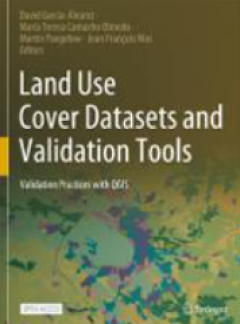
Land Use Cover Datasets and Validation Tools : Validation Practices with QGIS
This chapter sets out the aims of this book and explains themethods and approaches applied in its production. It alsoaspires to be a guide, offering readers instructions as to howbest to use the book. We therefore strongly encourage allreaders to read this chapter carefully, so as to gain a clearerunderstanding of all the different aspects analysed in thisbook. This chapter also provides essent…
- Edisi
- -
- ISBN/ISSN
- 9783030909987
- Deskripsi Fisik
- 459 hlm
- Judul Seri
- -
- No. Panggil
- 624 OLM l
E-book Becoming a Scholar : Cross-cultural reflections on identity and agency…
Our story begins in a part- time Doctor in Education (EdD) programme offered at the UCL Institute of Education. It is the beginning of the aca-demic year and a cohort of about 20 students has assembled in a class-room. The students, however, are not from London nor do they live anywhere in the United Kingdom. Instead, they have travelled to the op…
- Edisi
- -
- ISBN/ISSN
- 9781787357662
- Deskripsi Fisik
- 195 hlm
- Judul Seri
- -
- No. Panggil
- 378 NYG b

E-book Contemporary Challenges in Securing Human Rights
Since 1948, the study of human rights has been dominated by legal scholarship that has sought to investigate the development of human rights law, emerging jurisprudence, regional systems, the decisions and recommendations of human rights mechanisms and institutions and to a lesser extent the ‘compliance gaps’ between state commitments and actions. Even so, in all of these spheres there are …
- Edisi
- -
- ISBN/ISSN
- 9780993110221
- Deskripsi Fisik
- 166 hlm
- Judul Seri
- -
- No. Panggil
- 341.48 LEN c

E-book Biodiversity of the Gulf of Guinea Oceanic Islands : Science and Conse…
The Portuguese explorer Francisco Newton was one of thefirst naturalists todedicate almost one decade to the study of the outstanding diversity of the Gulf ofGuinea oceanic islands. The collections he made, in what was largely unexploredterritory for science, allowed the description of dozens of new species and began toreveal intriguing biogeographic patterns. Gazing at the species he was colle…
- Edisi
- -
- ISBN/ISSN
- 9783031061530
- Deskripsi Fisik
- 707 hlm
- Judul Seri
- -
- No. Panggil
- 577 ALM b
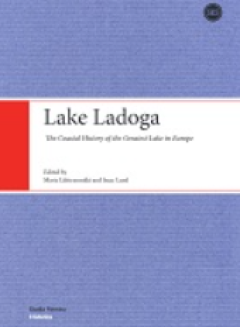
E-book Lake Ladoga : The Coastal History of the Greatest Lake in Europe
Coastal history has been a reference point in maritime, harbor, and naval history, coastal urban history and interdisciplinary marine studies,4but it is only in the last twenty years that climate change has stimulatedenvironmental humanities5practitioners to focus on water, sustainable management of its resources, and multidisciplinary studies.6 In the pro…
- Edisi
- -
- ISBN/ISSN
- 9789518586305
- Deskripsi Fisik
- 237 hlm
- Judul Seri
- -
- No. Panggil
- 320.58 BJO l
E-book Moral Ecology of a Forest : The Nature Industry and Maya Post-Conserva…
For the Maya, the landscape in which they live, the k’aax (forest), has a moral ecology. It is the place where they feel “at home in the world,” where they are situated in an everyday engagement with their environment. It is also where their history, identity, spiritual beliefs, communion with other species, and ulti-mately their survival are rooted. The ethnic boundary that t…
- Edisi
- -
- ISBN/ISSN
- 9780816543465
- Deskripsi Fisik
- 214 hlm
- Judul Seri
- -
- No. Panggil
- 304.2 MAR m
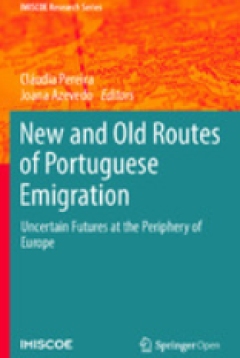
E-book New and Old Routes of Portuguese Emigration : Uncertain Futures at the…
Few studies have addressed recent emigration from European countries. The refu-gee crisis and migratory pressure have helped keep academic attention over the last few decades focused on immigration, asylum, reception and integration in Europe. However, these dynamics promoting entries into European countries coexist with other fairly significant dynamics promoting departures fro…
- Edisi
- -
- ISBN/ISSN
- 9783030151348
- Deskripsi Fisik
- 300 hlm
- Judul Seri
- -
- No. Panggil
- 304.82469 ABR n
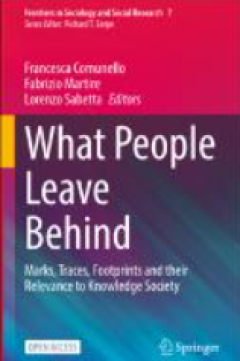
E-book What People Leave Behind : Marks, Traces, Footprints and their Relevan…
Sure, paleontologist and historians can make a virtue out of necessity (see, e.g.,Muir,1991; Zemon Davis,2010:5–6; Peltonen,2012; Bassi,2016), but the com-monsensical assumption is that immediate observation and interrogation of phenom-ena in their entirety are preferable—time travel would be more effective.1However,the recourse to traces is getting more frequent not only for studying the h…
- Edisi
- -
- ISBN/ISSN
- 9783031117565
- Deskripsi Fisik
- 356 hlm
- Judul Seri
- -
- No. Panggil
- 301 AGO w
E-book Bahasa Spanyol Bahasa Sahabatku
- Edisi
- -
- ISBN/ISSN
- 9786024379391
- Deskripsi Fisik
- 2008
- Judul Seri
- -
- No. Panggil
- 460 CAS b
- Edisi
- -
- ISBN/ISSN
- 9786024379391
- Deskripsi Fisik
- 2008
- Judul Seri
- -
- No. Panggil
- 460 CAS b
E-book Collective Bargaining and the Gig Economy : A Traditional Tool for New…
Whether a Kuhnian change of paradigms in business or simply a new way of performing traditional activities, the gig economy is a latent issue, and its regula-tion is extremely diverse in the Member States of the European Union (EU). Its very terminology is still the object of debate. The beatific initial designation of the ‘sharing economy’ is curren…
- Edisi
- -
- ISBN/ISSN
- 9781509956210
- Deskripsi Fisik
- 311 hlm
- Judul Seri
- -
- No. Panggil
- 331.011 ADA c
E-book Altering Crop Management Practices to Promote Pollinators
Agricultural intensification, or the increase in crop production per unit land area, has resulted in high-input, large-scale monoculture cropping and overall declines in crop diversity in the USA (Aguilar et al., 2015) and greater homogeneity in the crops grown across regions at a global scale (Martin et al., 2019). This has often resulted …
- Edisi
- -
- ISBN/ISSN
- 9781801465700
- Deskripsi Fisik
- 23 hlm
- Judul Seri
- -
- No. Panggil
- 638.1 FRA a
E-book Diversity in Computer Science : Design Artefacts for Equity and Inclusion
ll the research we present in this book took place in the Department of Computer Science at the University of Copenhagen (Datalogisk Institut Københavns Universitet [DIKU]), in Denmark. Thus, our work is situated in Denmark, and since gender is culturally shaped (Butler 1999), providing some contextual information about the Computer Science Department is important. The Univer…
- Edisi
- -
- ISBN/ISSN
- 9783031133145
- Deskripsi Fisik
- 139 hlm
- Judul Seri
- -
- No. Panggil
- 004 BJO d
E-book Bioeconomy and Global Inequalities : Socio-Ecological Perspectives on …
The term ‘bioeconomy’ is commonly met with a sense of uncertaintyregarding its meaning and purpose. In general, there are three differentfields of public and scientific debate about the bioeconomy. NicholasGeorgescu-Roegen (1971) referred to the bioeconomy as a transforma-tional pathway towards a degrowth society. In contrast, the debate about‘biocapitalism’ focuses on the commodificati…
- Edisi
- -
- ISBN/ISSN
- 9783030689445
- Deskripsi Fisik
- 339 hlm
- Judul Seri
- -
- No. Panggil
- 320.58 BAC b
E-book Comics of the New Europe : Reflections and Intersections
Despite claiming to offer surveys of “world comics,” global histories of graphic narrative replicate some of the aporias present in the relatively impossible category of “world” or “global” literature.2 Even more narrowly defined surveys of European comics focus primarily on the “Franco-Belgian” tradition, thus swiftly setting aside …
- Edisi
- -
- ISBN/ISSN
- 9789461665270
- Deskripsi Fisik
- 291 hlm
- Judul Seri
- -
- No. Panggil
- 741.5 ALA c
E-book Apotropaia and Phylakteria: Confronting Evil in Ancient Greece
The belief in the existence of evil forces was part of ancient everyday life and a phenomenon deeply embedded in popular thought of the Greek world. Stemming from a conference held in Athens in June 2021, this volume addresses the apotropaia and phylakteria from different perspectives: via literary sources, archaeological material, and iconography.
- Edisi
- -
- ISBN/ISSN
- 9781803277509
- Deskripsi Fisik
- 280 halaman, ilus.
- Judul Seri
- -
- No. Panggil
- 930.1 SPA a
E-book Hydrohumanities : Water Discourse and Environmental Futures
In the twenty-first century, a new water discourse is emerging, carried by the humanities. It focuses on cultural changes, such as an emphasis on gender and race differentiations in water relations, ways water features in urban design, and decolonial analyses of water practices. It is deeply informed by new materialist and posthumanist attention to the acti…
- Edisi
- -
- ISBN/ISSN
- 9780520380462
- Deskripsi Fisik
- 271 hlm
- Judul Seri
- -
- No. Panggil
- 333.9 DEW h
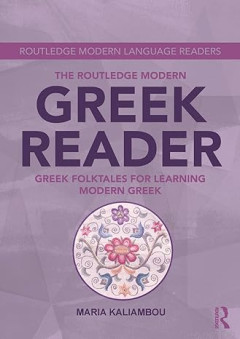
E-book The Routledge Modern Greek Reader
The Routledge Modern Greek Reader has been specially designed for post-beginners to advanced learners of Greek. Written by an experienced instructor, this innovative reader offers both students and teachers of Modern Greek the pedagogical tools to utilise richly textured folktale material in a language class. Students can develop their linguistic skills while simultaneously engaging with the…
- Edisi
- -
- ISBN/ISSN
- 9781315749914
- Deskripsi Fisik
- 180 halaman
- Judul Seri
- -
- No. Panggil
- 487.4 KAL t 002899-eB-0122
E-book The Roadmap to a Low-Carbon Urban Water Utility : An international gui…
he transition to low-carbon urban water utilities is an innovative idea, only currently embraced by a few forward-thinking utilities. This roadmap is directed at urban water utility managers in charge of planning future actions, as well as at the stakeholders who will support the utility action plans. Because only a few ‘early adopter’ utilities have embarked on a low-carbon transition, thi…
- Edisi
- -
- ISBN/ISSN
- 9781780409924
- Deskripsi Fisik
- 51 hlm
- Judul Seri
- -
- No. Panggil
- 628.1 BAL t
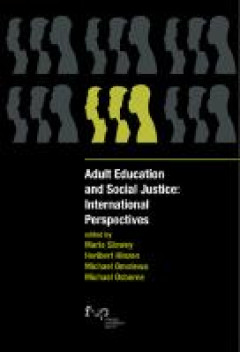
E-book Adult Education and Social Justice: International Perspectives
This book investigates the ways in which the social purposes of adult education are (re)interpreted over time, and between the global south and global north. It brings together thirty-seven authors from fourteen countries with extensive experience as academics and/or practitioners in the field. The book is inspired by the work and life of Lalage Bown, a leading proponent of post-colonial and in…
- Edisi
- -
- ISBN/ISSN
- 9791221502879
- Deskripsi Fisik
- 326 halaman
- Judul Seri
- -
- No. Panggil
- 230.007 SLO a
E-book The State of Food Security and Nutrition in the World 2022
The 2020 edition of this report included, for the first time, global estimates of the cost and affordability of a healthy diet. These are useful indicators of people’s economic access to nutritious foods and healthy diets. The effects of inflation in consumer food prices stemming from the economic impacts of the COVID-19 pandemic and the measures put in place to contain it, are clear and sign…
- Edisi
- -
- ISBN/ISSN
- 9789251364994
- Deskripsi Fisik
- 260 hlm
- Judul Seri
- -
- No. Panggil
- 613.2 HOL t

E-book Experiencing and Envisioning Food
Experiencing and Envisioning Food: Designing for Change contains papers on gastronomy, food design, sustainability, and social practices research as presented at the 3rd International Food Design and Food Studies Conference (EFOOD 2022, Lisbon, Portugal, 28-30 April 2022). The contributions explore potential solutions to current problems in the food system, and outline scenarios on the future o…
- Edisi
- -
- ISBN/ISSN
- 9781032479897
- Deskripsi Fisik
- 263 halaman
- Judul Seri
- -
- No. Panggil
- 664 BON e
E-book The Philosophy of Mathematics Education
This ICME-13 Topical Survey is designed to provide an overview of contemporaryresearch in the philosophy of mathematics education. This is a broad cluster ofoverlapping but at times disparate themes. In thefirst instance, this publicationexposes some of the problems and questions in mathematics education that thephilosophy of mathematics education clarifies, illuminates and sometimes helps toso…
- Edisi
- -
- ISBN/ISSN
- 9783319405698
- Deskripsi Fisik
- 33 hlm
- Judul Seri
- -
- No. Panggil
- 510.1 ERN t
E-book Loss and Damage from Climate Change : Concepts, Methods and Policy Opt…
Despite advances, thedebate currently is broad, diffuse and somewhat confusing, while concepts, meth-ods and tools, as well as directions for policy remain vague and often contested.This book, a joint effort of the Loss and Damage Network—a partnership effort byscientists and practitioners from around the globe—provides evidence-based insightinto the L&D discourse by highlighting state-of-t…
- Edisi
- -
- ISBN/ISSN
- 9783319720258
- Deskripsi Fisik
- 563 hlm
- Judul Seri
- -
- No. Panggil
- 551.6 MEC l
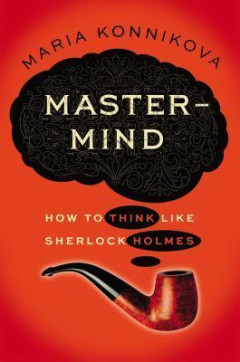
E-book Mastermind: How to Think Like Sherlock Holmes
No fictional character is more renowned for his powers of thought and observation than Sherlock Holmes. But is his extraordinary intellect merely a gift of fiction, or can we learn to cultivate these abilities ourselves, to improve our lives at work and at home? We can, says psychologist and journalist Maria Konnikova, and in Mastermind she shows us how. Beginning with the "brain attic"--Hol…
- Edisi
- -
- ISBN/ISSN
- 9780857867247
- Deskripsi Fisik
- 265 halaman
- Judul Seri
- -
- No. Panggil
- 001.01 KON m
 Karya Umum
Karya Umum  Filsafat
Filsafat  Agama
Agama  Ilmu-ilmu Sosial
Ilmu-ilmu Sosial  Bahasa
Bahasa  Ilmu-ilmu Murni
Ilmu-ilmu Murni  Ilmu-ilmu Terapan
Ilmu-ilmu Terapan  Kesenian, Hiburan, dan Olahraga
Kesenian, Hiburan, dan Olahraga  Kesusastraan
Kesusastraan  Geografi dan Sejarah
Geografi dan Sejarah